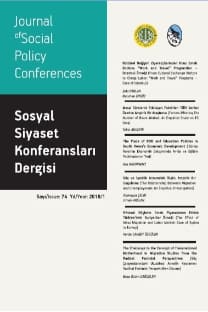Gelir Dağılımı Adaletsizliğini Azaltmak İçin Simülatörlü Program Önerisi
Gelir Dağılımı Adaletsizliği, Gini, Eşitsizlik, Simülasyon, Politika
Reducing the Wealth Gap with a Simulation-Based Proposal
Wealth Gap, Gini Coefficient, Inequality, Simulation, Policy,
___
- Barro, R. J. (2000, Mart). Inequality and growth in a panel of countries. Journal of Economic Growth, (5), s. 5-32. google scholar
- Berger, R. (2022, Ağustos 4). Anylogic/blog. Using simulation to explain the wealth gap in the world: https://www.anylogic.com/blog/using-simulation-to-explain-the-wealth-gap-in-the-world/?utm_source=medium&utm_medium=social-organic&utm_content=300822 adresinden alındı google scholar
- Birleşmiş Milletler Türkiye. (2023). Mayıs 2023 tarihinde Sürdürülebilir Kalkınma Amaçları: https://turkiye.un.org/tr/sdgs/10 adresinden alındı Chancel, L. (2021). Dünya Eşitsizlik Raporu 2022. World Inequality Lab. google scholar
- Europe Sustainable Development Solutions. (2022). Europe Sustainable Development Report 2022. Pica Publishing Limited. google scholar
- Floyd, D. (2022, Kasım 30). Investopedia/news. Measuring inequality: Forget Gini go palma: https://www.investopedia.com/news/measuring-inequality-forget-gini-go-palma/ adresinden alındı google scholar
- Gökçen, M., Boru, A., & Dosdoğru, A. T. (2018). İki Aşamalı tedarik zincirinde eş zamanlı stok kontrolünün ve tedarikçi seçiminin simülasyon optimizasyonu yaklaşımı ile analizi. Karaelmas Fen ve Mühendislik Dergisi, 5(1), s. 1-10. doi:10.7212%2Fzkufbd.v8i1.617 google scholar
- Hayes, A. (2022, Ağustos 5). Investopedia/terms. What is the gini index: https://www.investopedia.com/terms/g/gini-index.asp#toc-what-is-the-gini-index adresinden alındı google scholar
- Holland, J. H. (2012). Signals & Boundaries: Building Blocks For Complex Adaptive Systems. . Londra: The MIT Press. google scholar
- Lawlor, E. S. (2011). Why the Rich are Getting Richer? Londra: New Economic Foundation. google scholar
- Sardar, Z., & Abrams, I. (1998). Kaos: Düzensizlikteki Düzen. (D. Guliyeva, Çev.) İstanbul: NTV Yayınları. google scholar
- Stiglitz, J. E. (2012). The Price of Inequality: How Today’s Divided Society Endangers Our Future. New York: W.W. Norton & Co. google scholar
- Sundrum, R. (1990). Income Distribution In Less Developed Countries. New York: Routledge, Chapman and Hall, Inc. google scholar
- Wealth Gap Simulator. (2023). Goldratt Research Labs: https://www.wealthgapsimulation.com/sales-page1608229852018 adresinden alındı google scholar
- Zang, H. (1998). The stability of the Kuznets curve: some further evidence. Applied Economics Letters, 5(3), s. 131-133. google scholar
- ISSN: 1304-0103
- Yayın Aralığı: 2
- Başlangıç: 1948
- Yayıncı: İstanbul Üniversitesi Yayınevi
İşveren Sendikalarının Değişen Görünümü: Seçilmiş Ülkeler Üzerine Bir İnceleme
Türkiye’de Kamu Görevlileri Sendikacılığı Paradoksu: Güçlü Sendikacılık mı, Bağımlı Sendikacılık mı?
Gelir Dağılımı Adaletsizliğini Azaltmak İçin Simülatörlü Program Önerisi
Dört Konu, Bir Film: Sinemada ‘Emeği’ ve İzdüşümlerini Aramak
Türkiye’de Kadınların Sosyoekonomik Statülerinin Boşanma Oranlarına Etkilerinin Mekânsal Analizi
Göçmenlerle Çalışmak: Sosyal Hizmet Saha Çalışanlarının Deneyimleri Üzerine Nitel Bir Araştırma
X, Y ve Z Kuşaklarının Çalışmanın Anlamı ve Endüstri 4.0’a Bakış Açıları Üzerine Bir İnceleme
Sosyal Yardım Sorunu Olarak Sosyal Yardım Bağımlılığı
Küresel İklim Değişikliği: İklim Mültecilerinin Güvenlik Sorunları
